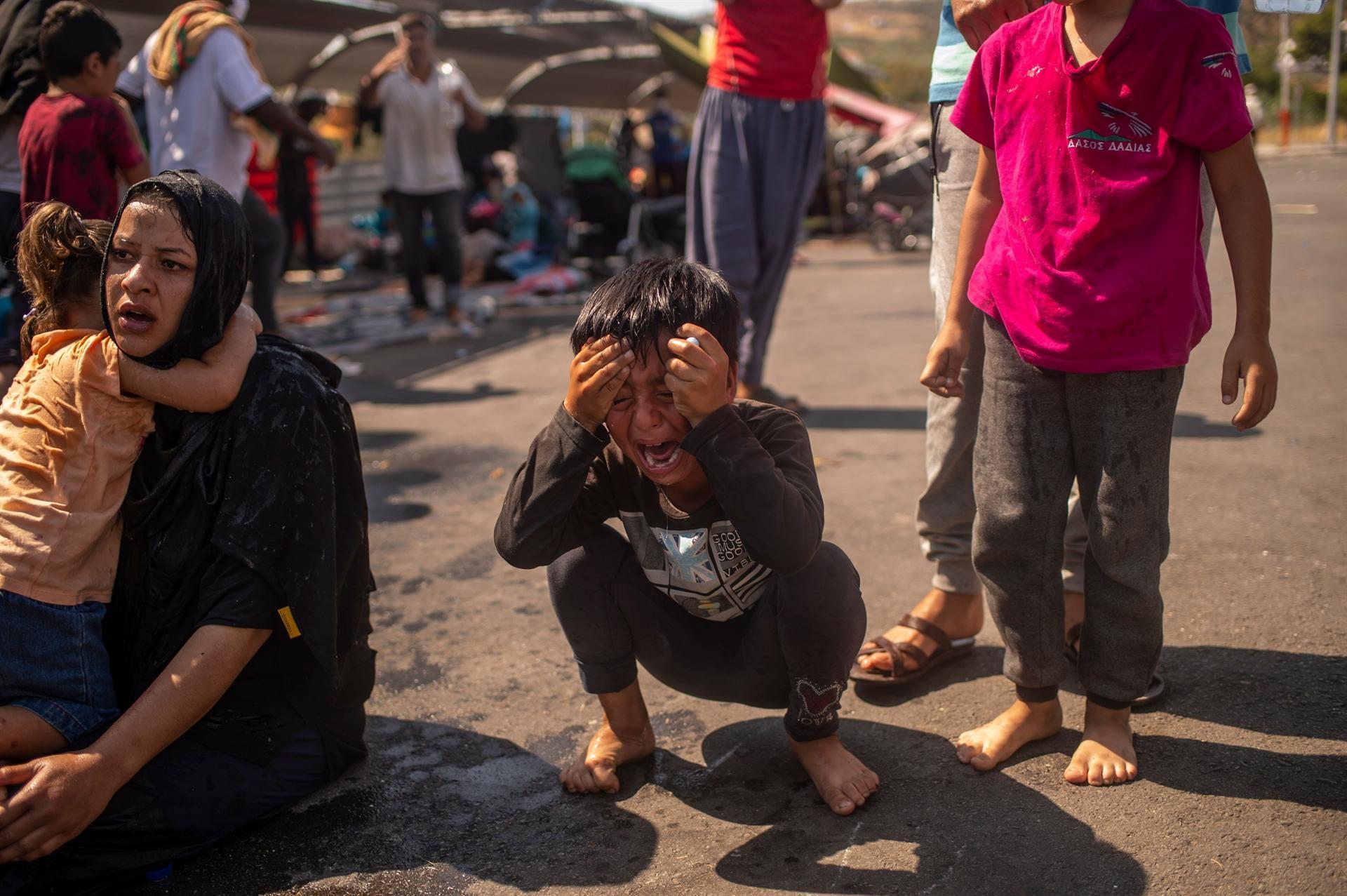
Greek riot police fired tear gas at protesting asylum-seekers on the island of Lesbos on Sept. 12, as thousands demanded help after being left homeless by fires that destroyed Europe's largest migrant camp.
Asylum-seekers - including the elderly and very young children - have been sleeping rough on Lesbos since Sept. 9 when the Moria camp was gutted in apparent arson attacks.
Clashes occurred on Sept. 12 near a new temporary camp built by Greek authorities where hundreds of migrants staged a generally peaceful demonstration.
Some young men started throwing stones at riot police who responded with tear gas.
Earlier in the day, fire fighters had to put out a fire near a police blockade.
"We were protesting peacefully against the new camp and the police threw tear gas against us. My baby had the gas in her eyes!" Zola, a Congolese woman carrying her five-month-old baby, told AFP.
Some people suffering from respiratory problems were taken away in ambulances, while others fainted, according to the migrants.
Adding to the chaos, migrants wrestled each other to grab water bottles thrown out of vans, AFP photographers reported.
Migration Minister Notis Mitarachi told reporters that keeping access open to food, water and medical supplies was a "priority", even as aid organisations said they had difficulty reaching the homeless.
Efforts to find temporary shelter for over 11,000 people left on the street by the destruction of the Moria camp were still inadequate, rights groups said.
"As thousands are now left sleeping rough in the hills around Moria or on the streets, tensions between local residents, asylum-seekers and police are increasing," Human Rights Watch warned in a statement on Sept. 12.
The Moria camp, regularly criticised by the UN and rights groups for overcrowding and poor sanitation, burned down in successive fires on Tuesday night and Wednesday.
Government officials blamed migrants for the blazes, the first breaking out shortly after 35 people tested positive for coronavirus and were facing isolation measures.
On Sept. 12, a 20-day-old Afghan baby was found positive for coronavirus, state agency ANA said. The baby and its mother, who also tested positive, were expected to be transported to Athens.
Coronavirus, along with the migration issue, make for an "explosive mix" the Greek PM, Kyriakos Mitsotakis said on Sept. 12 in a keynote address in the northern city of Thessaloniki.
"It is true that these last months we faced many turbulences...That's why we are here, to face the difficulties," he said. Hours earlier, at the main entrance to the new 3,000-capacity camp of Kara Tepe, a few kilometres away from Moria, queues began forming, with some migrants agreeing to enter to secure shelter and food.
According to police, around 200 migrants had been admitted by on Sept. 12 evening, mostly families, as dozens more others waited outside for hygiene and safety checks.
Some Afghans were trying to dissuade them.
Anybody entering is tested for coronavirus, and is also frisked for flammable materials and cooking gas cannisters, the police said.
Alexandros Ragavas, a spokesman for the migration ministry, said vulnerable asylum-seekers would be the first to be housed.
"We will give priority to families. It will be tents of six and the camp will be separated by ethnicities," he told AFP.
Local volunteer groups have struggled to supply asylum-seekers with food and water.
"We are sleeping in the dirt or on the road under the open sky," a group of migrants from the former camp said on Facebook. Some people had even found shelter under the trees of the local Greek cemetery, they added.
Migration Ministry officials said on Sept. 12 that the plan was to have tents for everybody and accelerate the asylum procedure.
The plight of the stranded families has prompted other European countries to offer to take in hundreds of asylum-seekers, particularly unaccompanied youngsters.
But Greece has long complained that, aside from providing funds, its EU partners have done too little to help.
Past efforts to create a quota system, in which all European countries would have agreed to take in refugees from Greece, foundered due to opposition from right-wing populist governments such as those in Poland and Hungary.
The fires highlighted the failure of the EU's approach on the Greek islands, said HRW.